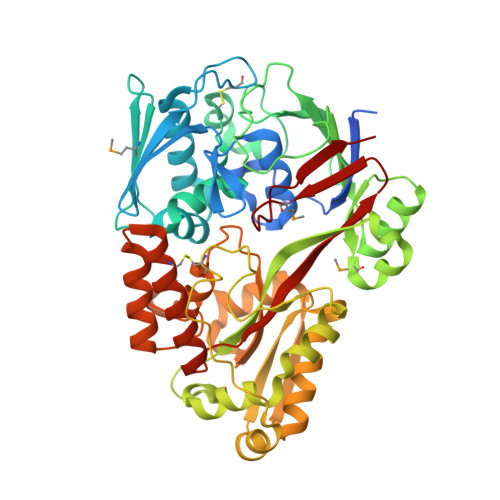Structural basis of substrate recognition by the substrate binding protein (SBP) of a hydrazide transporter, obtained from Microbacterium hydrocarbonoxydans.
Shimamura, K., Akiyama, T., Yokoyama, K., Takenoya, M., Ito, S., Sasaki, Y., Yajima, S.(2020) Biochem Biophys Res Commun 525: 720-725
- PubMed: 32143826
- DOI: https://doi.org/10.1016/j.bbrc.2020.02.146
- Primary Citation of Related Structures:
6LU2, 6LU3, 6LU4 - PubMed Abstract:
Microbacterium hydrocarbonoxydans was isolated, using hydrazide compounds as its sole carbon source. The key enzyme that metabolizes these compounds was identified as hydrazidase, and the operon containing the gene coding for the enzyme, was revealed by genome sequencing. The operon also contained genes coding for an ATP-binding cassette transporter (ABC transporter), which was expected to transport the hydrazide compounds. Substrate binding protein (SBP), a component subunit of the transporter, plays an important role in recognizing the correct substrates for transport. Therefore, to elucidate the mechanism of recognition of the unnatural hydrazide compounds, we determined the crystal structures of the SBP, obtained from M. hydrocarbonoxydans (Mh-SBP), complexed with and without the hydrazide compound, at 2.2 Å and 1.75 Å resolutions, respectively. The overall structures of Mh-SBP were similar to those of the SBP in oligopeptide transporters such as OppA. On comparison, the liganded and unliganded structures of Mh-SBP showed an open - close conformation change. Interestingly, the binding mode of the compound to Mh-SBP was almost identical to that of the compound to hydrazidase, suggesting that the ABC transporter served transporting these compounds. Furthermore, based on the hydrazide complex structure, paraben, the other putative substrate of the protein, was successfully used with Mh-SBP to obtain the paraben complex structure.
Organizational Affiliation:
Department of Bioscience, Tokyo University of Agriculture, Setagaya-ku, Tokyo, Japan.















